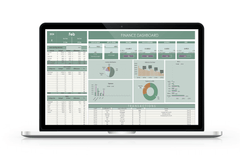UK Edition · 2026
Most people think budgets get blown by big emergencies.
They don’t.
It’s the small, repeated decisions that quietly drain your money week after week.
Here are the 10 biggest silent budget killers — and what to do instead.

1. Paying Bills Randomly Throughout the Month
The problem:
Payments leave on different days → cash flow is unpredictable → overdraft fees happen.
Fix:
Move all bills to the same payday week or create a Bills Pot and move money in once a month.
To help you started download Free Budget Template - monthly and annual overview.
2. “Small Treat” Spending That Adds Up
£3.50 here, £8 there… becomes £150+ a month.
Fix:
Give yourself a weekly personal pot. When it’s gone, it’s gone.
3. Not Having a Sinking Fund
Car MOT and insurance (UK insurers typically charge between 20% and 31% extra for monthly car insurance payments compared to paying the full annual premium upfront.), kids expenses/classes, gifts, insurance — they’re not unexpected, but they always feel like emergencies.
Fix:
Create 3–5 simple sinking funds:
| Car | Home | Holiday | Gifts | Pets |
Start by adding £10–£30 a month to each savings pot. As you watch the balances grow, you’ll gain confidence and can increase your regular contribution over time. If you have a lump sum available, put that in first—then set up a monthly top-up of £10–£30 to keep the momentum going. This approach helps your savings build steadily, whether you begin with small amounts or a one-off boost.
4. Relying on Willpower Instead of Structure
If you “try to be mindful,” you will overspend.
Everyone does.
Fix:
Automate savings and weekly spending pots so structure replaces discipline.
Related: How to Automate Your Budget
5. Subscription creep
Research shows most people have 2–5 paid subscriptions they’ve lost track of, with some younger adults wasting up to £75 a year this way. In total, UK consumers spent over £688 million on unused subscriptions last year, and some households spend over £700 on subscriptions each year—with 1 in 8 paying more than £100 a month for these services.
How to Fix Subscription Creep:
- Review your bank transactions monthly and look for recurring charges.
- Cancel any subscription you haven’t used in the last 30 days.
- Use banking apps or budgeting tools that flag regular payments and help manage subscriptions in one place.
6. Buying Groceries Without a Plan
The UK grocery bill is indeed the biggest budget leak for most families, with the average family of four spending over £500 each month just on groceries alone—before factoring in eating out or takeaways. This expense is being driven higher by persistent food price inflation, shrinking package sizes, and impulse purchases. Many households overspend due to frequent supermarket trips, buying items they don’t need, or letting food go to waste.
How to Fix This Leak:
-
Plan Ahead: Choose three core meals for the week that your family enjoys and buy ingredients specifically for them—this tightens your shopping list and eliminates unnecessary extras.
-
Add Simple Staples: Supplement your meal plan with easy basics like pasta, rice, eggs, or frozen veggies. These can bulk out meals and save money compared to convenience foods.
-
Weekly Grocery Pot: Set a fixed “pot” or budget for your weekly shop. This creates a hard cap on spending and helps you track your actual outlay with each visit.
-
Combine Strategies: Inventory your fridge and cupboards before shopping, stick to your list, and use supermarket loyalty schemes for extra discounts.
Families who consistently plan meals and stick to a budget can cut their grocery bill by up to 20%, often saving £100s over the year. The key is focusing on must-haves, bulk staples, and limiting impulse buys, turning the biggest budget leak into one of the easiest wins for your finances.
Want to quickly check how your budget id doing?
Try our Online Free Budget Calculator
.
7. Using BNPL or Minimum Payments “Just This Once”
Buy Now Pay Later delays the problem and increases the cost.
Why Is This a Budget Leak?
Delaying repayment means the debt grows quietly. The original purchase can end up costing far more—sometimes double or triple the first price—especially for those who pay the minimum for months or years.
How to Fix:
-
If using credit is unavoidable, always pay extra, even a small amount (£10–£20), on top of the minimum or scheduled BNPL payment.
-
Set automatic monthly overpayments so some debt is knocked off without effort.
-
Prioritise making full payments as soon as possible; check statements regularly for missed payments or fees.
Even small overpayments help reduce your outstanding balance faster, cut interest costs, and stop “just this once” turning into a costly routine. This strategy keeps your credit healthy and prevents BNPL or credit cards from leaking away your disposable income.
8. Letting Refunds & Billing Errors Derail You
If you rely on that money to come back, you’re exposed.
Fix:
Create a buffer pot (£100–£300) so nothing collapses when a refund is late.
9. Not Reviewing Your Budget Monthly
Your budget is a living system. If you don’t check it, it will drift.
Fix:
Run a 10-minute monthly check-in:
- What went up?
- Any surprise charges?
- Did savings move?
- Any category too tight?
Related: How to Review Your Budget Each Month (Without Overwhelm)
10. Keeping All Your Money in One Big Account
This is the #1 silent budget killer.
Your brain sees one number and spends it.
Fix:
Split your income into pots:
- Bills
- Groceries
- Weekly spending
- Savings
- Sinking funds
- Buffer
Your money stays in its lanes automatically.
The Bottom Line
You don’t need a stricter budget — you need a smarter flow.
Fix these 10 small leaks and you’ll:
✔ Save more
✔ Stress less
✔ Stop accidental overspending
✔ Build real financial stability
Your next steps
Want a simple system that handles this automatically?





